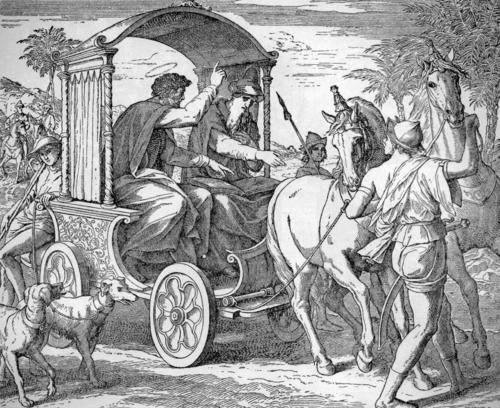A Miracle of Transportation
Now when they came up out of the water, the Spirit of the Lord caught Philip away, so that the eunuch saw him no more; and he went on his way rejoicing. But Philip was found at Azotus. And passing through, he preached in all the cities till he came to Caesarea. (Acts 8:39-40)
Sometimes God does unusual things. Here is an example in Acts 8. Philip was God’s instrument in bringing the good news of Jesus Christ to an Ethiopian man on a wilderness road. After leading the man to faith and baptism, Philip and the new convert came up out of the water. When they did, the unusual thing happened: the Spirit of the Lord caught Philip away, so that the eunuch saw him no more. The evangelist simply disappeared from the sight of the Ethiopian eunuch.

The inspired record is clear that this was a work of the Spirit of the Lord. Philip was supernaturally transported away from the place of baptism. But Philip didn’t go to heaven; instead, Philip was found at Azotus. It was a miracle of transportation.
This was a strange, perhaps unprecedented event in the Scriptures. But a similar thing happened when the disciples’ boat came immediately to its destination (John 6:15-21), and a something like this will also happen when the church is caught up together with Him at the rapture (1 Thessalonians 4:15-18).
What happened to the Ethiopian eunuch? He went on his way rejoicing. This joy of the Ethiopian, even after Philip’s strange departure, showed that his faith was firmly rooted in God, not in Philip.
What happened to Philip? He did the work of an evangelist, and he preached in all the cities till he came to Caesarea. This shows that Philip started preaching not only to Samaritan cities, but also the Gentile cities – such as Caesarea. This was the very beginning of the gospel’s spread to the end of the earth – as Jesus commanded in Acts 1:8.
Now, think again about this unusual miracle. When God does such surprising things, there are two wrong ways to respond. Some respond with doubt and unbelief, saying “How could God possibly do such a thing?” Some respond with distracted focus, trying to re-create and re-experience these remarkable events.
We should not fall into either error. Yes, we believe that God can do and does do unusual things. Yes, we keep our focus on Jesus and His good news, and not allow ourselves to be distracted with the desire to re-create unusual things God does.
Philip is a great example to us. He directly experienced this miracle of transportation. Yet, having experienced it, he got to the work of evangelism. He didn’t wait around for God to miraculously transport him somewhere else! No wonder Philip is the only one with the title, “The Evangelist” (Acts 21:8).
Don’t wait for God to do unusual things. Get busy with what He has called you to do, and let God take care of the unusual things.


















